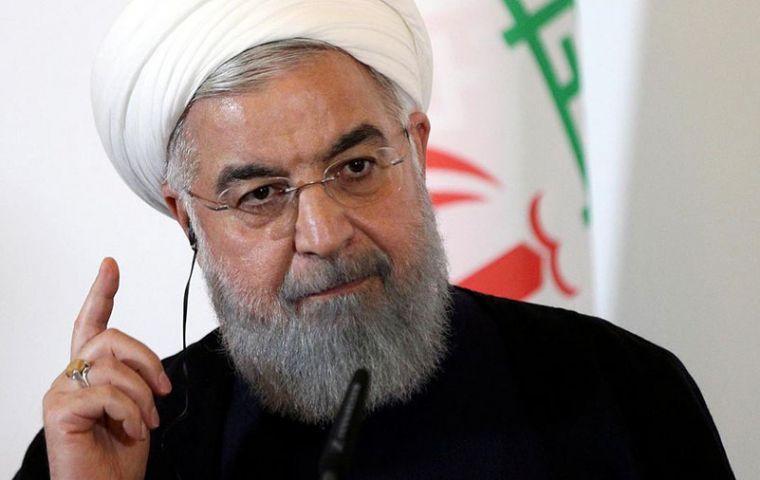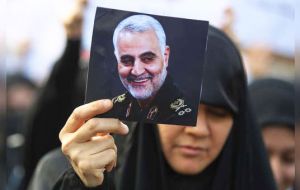MercoPress. South Atlantic News Agency
Iran wants to avoid war and promotes peace dialogue with the world
 “The government is working daily to prevent military confrontation or war,” Rouhani said in a televised speech.
“The government is working daily to prevent military confrontation or war,” Rouhani said in a televised speech.  The region seemed on the brink of new conflict earlier in January after the US killed top Iranian general Qasem Soleimani in a drone strike in Baghdad
The region seemed on the brink of new conflict earlier in January after the US killed top Iranian general Qasem Soleimani in a drone strike in Baghdad  Tensions between the two enemies seemed to subside in the wake of the accidental downing of a Ukrainian passenger airliner killing 176 people
Tensions between the two enemies seemed to subside in the wake of the accidental downing of a Ukrainian passenger airliner killing 176 people Iranian President Hassan Rouhani said on Friday he wants to avoid war after Tehran and Washington appeared on the brink of direct military confrontation in early January for the second time in less than a year.
Ahead of parliamentary elections on Feb 21 - predicted to be a challenge for Rouhani's camp - and amid high tensions between Tehran and the West over Iran's nuclear program, the president said dialogue with the world was still “possible”.
“The government is working daily to prevent military confrontation or war,” Rouhani said in a televised speech.
The region seemed on the brink of new conflict earlier in January after the US killed top Iranian general Qasem Soleimani in a drone strike in Baghdad, prompting Iran to retaliate against US military targets in Iraq with a volley of missiles days later.
The strike caused significant material damage but no casualties, according to the US military.
Rouhani said the strike amounted to “compensation” for the death of Soleimani, the architect of Iran's Middle East military strategy.
The tensions between the two enemies seemed to subside in the wake of the accidental downing of a Ukrainian passenger airliner hours after the retaliatory strikes, as Iran was on high alert for US reprisals. The tragedy killed 176 people, mostly Iranians and Canadians.
Canada's foreign minister on Thursday vowed to push Iran for answers about the tragedy.
“Families want answers, the international community wants answers, the world is waiting for answers and we will not rest until we get them,” Francois-Philippe Champagne said in London.
In Iran, the air disaster sparked outrage and anti-government demonstration took place every day from Saturday to Wednesday. Security forces were deployed across the capital in response to the protests.
Concentrated in the capital, they appeared smaller than a wave of national protests in November. Prompted by a fuel price hike, those demonstrations were met with a crackdown that left at least 300 people dead, according to Amnesty International.
Rouhani implicitly acknowledged a crisis of confidence in authorities, but looked to regain control on Wednesday, calling for “national unity”, better governance and more pluralism. On Thursday, Rouhani also defended the policy of openness to the world that he has pursued since his first election in 2013, and which Iran's ultra-conservatives criticize.
“Of course, it's difficult,” he acknowledged, but he added, “the people elected us to lower tensions and animosity” between the Islamic republic and the world.




Top Comments
Disclaimer & comment rulesCommenting for this story is now closed.
If you have a Facebook account, become a fan and comment on our Facebook Page!